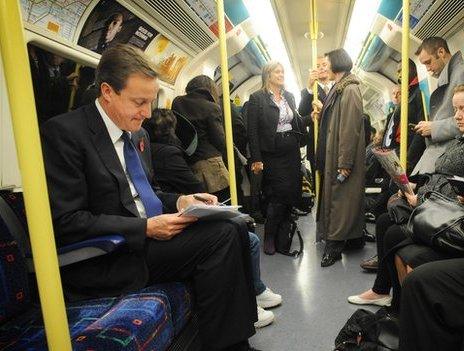When leaders go out in public
- Published
Mr Stoltenberg said it was the first time he had driven for eight years
Norway's Prime Minister Jens Stoltenberg spent a recent afternoon working as a thinly disguised taxi driver in Oslo. But he is not the only political leader to attempt to commune with the public in unorthodox ways, writes Ed Lowther.
While Mr Stoltenberg was keen to gauge the public's views on a range of issues, Roman Emperor Nero was keener on terrorising the public. Heavily disguised and accompanied by thugs, he roamed the streets attacking his subjects.
Anglo-Saxon King Alfred the Great disguised himself as a peasant to evade capture from the Vikings, and proved himself to be hopeless at baking. Another tale has him venturing into the Viking camp disguised as a minstrel, to find out what the Vikings were planning.
Russian Tsar Peter the Great toured 17th century Europe in the guise of a common sailor to learn about shipbuilding.
Many would have seen through Peter's disguise, but some leaders make no efforts at all. In May 1970, US President Richard Nixon once insisted on putting in a pre-dawn surprise appearance at a student protest against the Vietnam War. He sought to win over his astonished interlocutors: "I said: 'I know you, that probably most of you think I'm an SOB. But I want you to know that I understand just how you feel.'"
In a mysterious incident later denounced as a hoax, current Chinese President Xi Jinping once supposedly eschewed his private car and hopped into a cab. He reportedly probed the driver's views on air pollution before confessing his true identity. "Everyone is equal," Mr Xi supposedly told his driver, "and I'm from the grassroots too."

UK politicians are not immune from the desire to appear in touch with the people by taking public transport. Tony Blair, David Cameron, and Boris Johnson have all travelled on London's underground network accompanied by trusty photographers.
But it's hard to imagine any such recognisable figures enduring the ignominious fate of Stanley Baldwin, who was prime minister three times in the 1920s and 30s. According to one story recounted by political historian Lord Hennessy, he once found himself "on a train sitting opposite a fellow old Harrovian who suddenly remembered who he was and asked him what he ended up doing in life".
You can follow the Magazine on Twitter, external and on Facebook, external